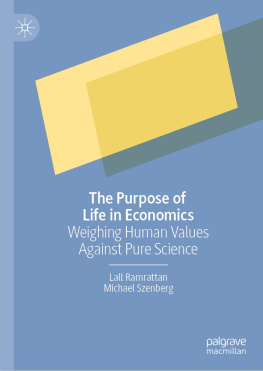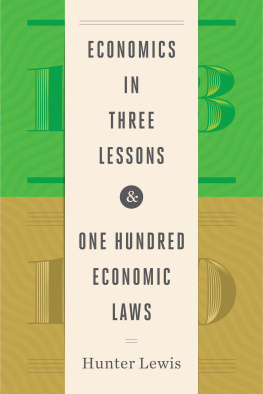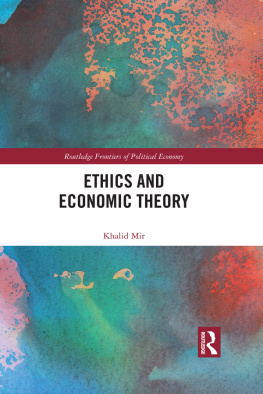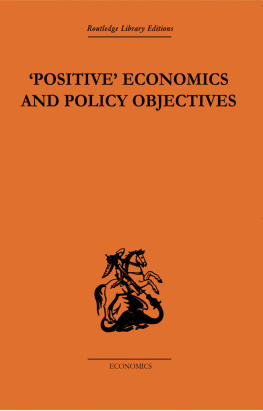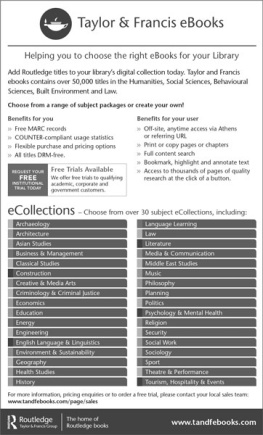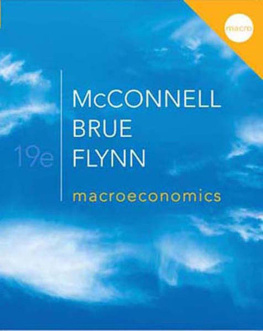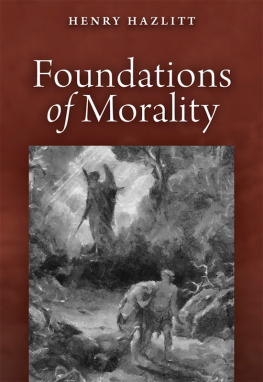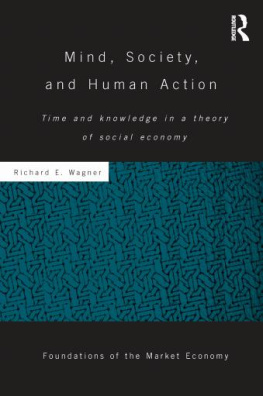M any people assisted me in the completion of this book. I want to thank David Westrate and the Tithes and Offerings Foundation for providing a significant grant of financial assistance to help cover expenses. Grove City College graciously provided a sabbatical, allowing me to do much concentrated research and writing. Ronda Credille, Jeffrey Herbener, and David Whitlock read every word of earlier drafts, providing me with many helpful comments and suggestions. My student assistants, Jocelyn Bond and Robbie Long, provided invaluable help in research, editing, and graph composition.
It should be clear that my intellectual debts are from the Misesian tradition of Austrian economics and Reformed Protestant theology. My economic pedagogy relies heavily on Murray Rothbards Man, Economy, and State and the intellectual foundation laid by Carl Menger and Eugen von Bhm-Bawerk and built into a full edifice by Ludwig von Mises. The Ludwig von Mises Institute has been a great blessing to me by providing material, intellectual, and moral support as I seek to integrate economic theory with a Christian view of man and nature. In lieu of a myriad of footnotes, I list specific sources I rely upon as suggested readings at the end of each chapter. The reader should think of these as a chapter by chapter bibliography. An exhaustive bibliography is also given at the end of the book.
Soli Deo Gloria .
Introduction
W hen applying to graduate school to study economics, I was required to send letters of recommendation from three former professors. My college was a small, Christian liberal arts college that only had two economists on its faculty. In addition to soliciting letters from them, I asked one of my religion professors to write the third. I had taken two courses from this professor and knew him to appreciate at least my academic potential. When I telephoned him, asking that he write me a letter of recommendation for graduate school, he inquired about my chosen field of study. When I told him economics, he quickly replied, Oh, studying the things of this world, I see.
While my former professor was only joking, a none-too-small number of Christians believe that economics is about how greedy people satisfy their lust of the eye and pride of life. This view is incorrect for two reasons. In the first place, God is interested in both the spiritual and material aspects of his creation. Additionally, economics is a social science concerned with how people cooperate in the division of labor, not propaganda for squeezing the blood of the exploited working class out of the proletariat turnip.
God is interested in all of his creation, both spiritual and material. We know this because of what God tells us about his own opinion and care for the material world. God did, after all, create a material world. As the Nicene Creed puts it, he made all things visible and invisible, both material and spiritual. God tells us that after he was finished with creation he declared his handiwork very good (Gen. 1:31). Additionally, the apostle John tells us that one of the defining characteristics of a spirit that comes from God is one who acknowledges that Jesus Christ has come in the flesh (1 John 4:2). Jesus had to take on human flesh to become our sacrifice and he ate and drank enough to be wrongly accused of gluttony by the Pharisees. In light of these truths, it is hard to see how we can conclude that God is either dismissive of or actively opposed to the material part of his own creation.
It is easy to understand how people might dismiss economic subjects as too worldly if they read the Bible selectively. There are, after all, a number of passages in Gods Word that warn us against loving the things of this world, loving money, and storing up our treasures here on earth. However, one should not conclude from these caveats and commands that the Bible advocates some sort of anti-material asceticism.
That God is not ascetic is evident throughout Scripture. In Proverbs 6:611, for example, the writer instructs us to learn from the ant. What is the ant doing that we are to use as an example? It is working to make material provision for itself in the winter by working and gathering its food in the summer. In Genesis 2 we find that before the fall God commands Adam to cultivate and keep the garden and gives him the fruit of the trees from which he may freely eat. Later in Proverbs 12:11, God affirms the principle that material sustenance is to be had by work. He who tills his land will be satisfied with bread.... In Genesis 24:35 we read that God blessed Abraham with flocks and herds, silver and gold, male and female servants, and camels and donkeys. Needless to say, these are all material blessings.
In the book of Deuteronomy, God explains some principles relevant to tithing. He tells his people that they are to take a tenth of all their increase to the temple where a portion of it was to be joyfully eaten with the Levites and the poor. If people lived a long way from the temple, they could convert their commodities to be tithed into money. Then God commanded his people, Spend the money for whatever you desireoxen or sheep or wine or strong drink, whatever your appetite craves. And you shall eat there before the Lord your God and rejoice, you and your household. (Deut. 14:26). Clearly God is not Platonically anti-material.
Later in Deuteronomy, God pronounces a series of blessings and curses that will be meted out to his covenant people depending on whether they are obedient or disobedient to his law. In each series, the first blessings and curses are material in nature.
And if you faithfully obey the voice of the Lord your God, being careful to do all his commandments that I command you today, the Lord your God will set you high above all the nations of the earth. And all these blessings shall come upon you and overtake you, if you obey the voice of the Lord your God. Blessed shall you be in the city, and blessed shall you be in the field. Blessed shall be the fruit of your womb and the fruit of your ground and the fruit of your cattle, the increase of your herds and the young of your flock. Blessed shall be your basket and your kneading bowl. Blessed shall you be when you come in, and blessed shall you be when you go out (Deut. 28:15).
On a less happy note, God pronounces curses that are the exact opposite of the blessings:
But if you will not obey the voice of the Lord your God or be careful to do all his commandments and his statutes that I command you today, then all these curses shall come upon you and overtake you. Cursed shall you be in the city, and cursed shall you be in the field. Cursed shall be your basket and your kneading bowl. Cursed shall be the fruit of your womb and the fruit of your ground, the increase of your herds and the young of your flock (Deut. 28:1518).


